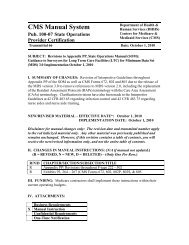LOUISIANA Community Mental Health Services Block Grant ...
LOUISIANA Community Mental Health Services Block Grant ...
LOUISIANA Community Mental Health Services Block Grant ...
You also want an ePaper? Increase the reach of your titles
YUMPU automatically turns print PDFs into web optimized ePapers that Google loves.
Hospitals has developed and continues to revise rules and regulations for certifying juvenile<br />
competency restoration providers, and has developed and recently revised a training module<br />
patterned after national best practices. Sixty-eight licensed mental health professionals were trained<br />
and certified as competency providers in 2009-2010. An additional sixteen unlicensed mental health<br />
professionals were trained to work with youth who are incompetent due to lack of education rather<br />
than behavioral health issues. The state continues to closely study issues relating to juvenile<br />
competency and to review programs in other states. The Office of Behavioral <strong>Health</strong> received a<br />
$40,000 grant in June 2010 to implement a pilot program in Orleans, St. Bernard, Plaquemines,<br />
Jefferson and Caddo parishes for youth found incompetent to stand trial who are in need of a more<br />
restrictive environment, but do not meet the criteria for hospitalization. The pilot program will<br />
provide therapeutic foster homes (mentor homes) for a limited number of youth who are found<br />
incompetent to stand trial and need intensive supervision, as well as wrap-around services, including<br />
but not limited to individual, group and family therapy. In addition, the state‟s Law Institute<br />
Subcommittee on the Children‟s Code continues to meet in order to study the same issues while<br />
developing additional legislation regarding training as well as the protection of children‟s rights.<br />
Additionally, the Office of Behavioral <strong>Health</strong> in collaboration with the Metropolitan Human <strong>Services</strong><br />
District and the Orleans Parish Juvenile Court are in the process of developing a Court Clinic which<br />
will screen, evaluate and provide treatment or refer for additional services youth who are charged<br />
with crimes and housed at the Youth Study Center, the local detention center in New Orleans. This<br />
will ensure that judicially involved youth in need of mental health or substance abuse services will be<br />
identified quickly and referred for appropriate services.<br />
Louisiana Youth Suicide Prevention<br />
The Louisiana Partnership for Youth Suicide Prevention (LPYSP) is a program that is geared towards<br />
reducing child and adolescent suicide; however, adults have benefitted from the program also. In<br />
2006, Louisiana was awarded funds under the Garrett Lee Smith Memorial Act from the Substance<br />
Abuse and <strong>Mental</strong> <strong>Health</strong> Service Administration (SAMHSA) to implement statewide youth suicide<br />
intervention and prevention strategies. Applied Suicide Intervention Specialist Training (ASIST), is<br />
one of several trainings which were initiated by this funding initiative. ASIST is a unique program<br />
that teaches a concise, face-to-face suicide intervention model that focuses on the reduction of the<br />
immediate risk of suicide. Participants in the training learn about their own attitudes concerning<br />
suicide, how to recognize and assess the risk of suicide, how to use an effective suicide intervention<br />
model, and about available community resources. ASIST is a model of suicide intervention for all<br />
gatekeepers and caregivers utilizing techniques and procedures that anyone can learn. The training is<br />
designed to increase skill levels, improve the ability to detect problems, and provide meaningful<br />
support to individuals experiencing emotional distress and serious mental health problems. The<br />
workshops are offered to educators, law enforcement, mental health professionals, clergy, medical<br />
professionals, administrators, volunteers, and anyone else who might be interested in adding suicide<br />
intervention to their list of skills. The program has been made available to all government agencies,<br />
consumer/advocacy agencies, emergency service providers, schools and families to help reduce the<br />
incidence of suicide in Louisiana. A 20-member training group has conducted ASIST, Safe Talk, and<br />
Suicide Talk Trainings statewide. This series of evidenced-based trainings has reached over 2,500<br />
people. Through the successful development of five suicide prevention coalitions in Shreveport,<br />
Lake Charles, Lafayette, Jefferson and Baton Rouge, the Partnership assisted communities to develop<br />
competence related to suicide risk identification and prevention activities; improved local<br />
collaboration; and promoted the coordination of culturally appropriate resources and services for the<br />
prevention of suicide.<br />
PART C <strong>LOUISIANA</strong> FY 2011 PAGE 90<br />
SECTION II: ADULT & CHILD/ YOUTH<br />
IDENTIFICATION & ANALYSIS OF SERVICE SYSTEM’S STRENGTHS, NEEDS, & PRIORITIES<br />
RECENT SIGNIFICANT ACHIEVEMENTS
















